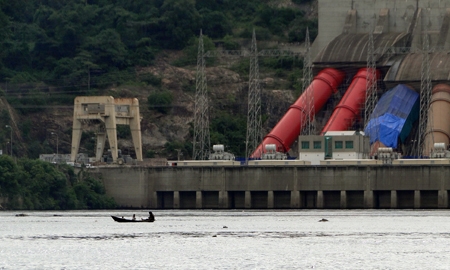With increasing modernization throughout the West African nation of Ghana, the
Volta River Authority (
VRA) – one of the nation’s most significant electricity enterprises – is quickly developing projects to meet these growing demands for industrial, commercial and domestic power, while continually focusing on becoming a leader in clean energy development.
With 67% of Ghanaians now having access to electricity, up from 15% in 1990, the
VRA – in close collaboration with the other major companies in its field, the Electricity Company of Ghana and
Ghana Grid Company (
GRIDCo) – will join the government in focusing on raising that number, as well as putting in place the necessary infrastructure needed to produce increased electricity for the nation and in the future, neighboring countries. This will also contribute greatly to the nation’s overall wealth, and has accounted for 5-6% of the rise in GDP of the 13.4% total.
Ghana currently produces 2,000 megawatts of electricity, with the goal of reaching 5,000 megawatts within the next three years. The
VRA will play a significant role in achieving this number.
“If you look at solar radiation maps, West Africa receives twice as much sunlight and radiation as Europe on an annual basis. The potential is real and clear.” Kweku Andoh Awotwi,
CEO of the Volta River Authority |
“Today the
VRA has plans in motion to put in about 500 megawatts in the next three years. We also have feasibility studies and plans under way to develop another 900 megawatts in five to seven years,” outlines Kweku Andoh Awotwi, CEO of the VRA since 2009 and previously the President of Ghana Chamber of Mines as well as the former Managing Director of the Ashanti Goldfields.
Mr. Awotwi highlights the projects that will allow the VRA to achieve its goal of 900 megawatts: first by using Ghana gas from the Jubilee Oil Fields and second, by taking part as a major player in a West African Power Pool (WAPP)-sponsored project, which will not only bring power to Ghana but also to other WAPP member countries.
Aside from the VRA’s commitment to enhancing the electricity supply within Ghana, it has also relentlessly advocated the need for renewable energy. The VRA primarily uses hydro and electric power, but Mr. Awotwi sees tremendous potential for further development of solar energy as a renewable source, drawing attention to ongoing projects to add both wind and solar energy.
“If you look at solar radiation maps, West Africa receives twice as much sunlight and radiation as Europe on an annual basis,” explains Mr. Awotwi, mentioning that although solar has always been an expensive source of energy, the recent proliferation within the market has caused a drop of almost 50% in the cost. “The VRA has acquired four land sites to build a minimum 10 MW of power. The potential is clear and is real.”
These measures are in line with the Ghanaian government’s recent legislation, the Renewable Energy Act, which calls for 10% of the country’s energy supply to be from green sources by 2020. Much of the investments for these renewable sources will come from foreign investments such as the United States and China.
Moreover, last year, the U.S. overtook China as the biggest investor in renewable energy in the West African nation with plans to invest $1.2 billion in the energy sector. According to Mr. Awotwi, who himself has spent a considerable amount of time in the States during his university studies at both Stanford and Yale University, American companies have been involved with the energy sector in Ghana since the Akosombo Dam and later went on to help build the first thermal plant using General Electric machines.
“The United States wants to collaborate and partner with Ghana in order to really unleash that potential,” says Mr. Awotwi. “Number one, the United States understands the issues; secondly, the companies that have worked with us in Ghana come from the United States; and thirdly, that collaboration wants to continue.”
Having this foreign direct investment is important for the continued infrastructure development in the country, but the VRA also sees the tremendous importance of corporate social responsibility within its home country. The company has developed schools, hospitals and social intervention activities. Mr. Awotwi himself is also the Chairman of the nonprofit PlaySoccer organization, using sports to encourage the development of underprivileged children.

0 COMMENTS